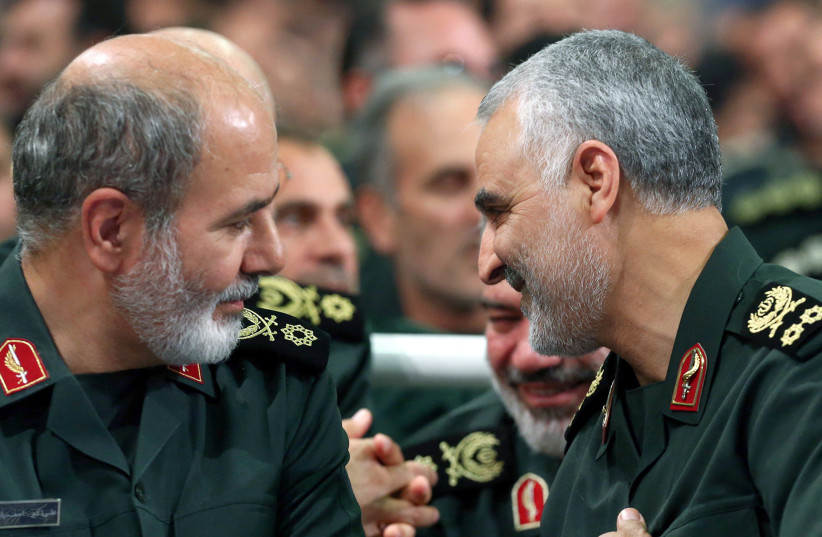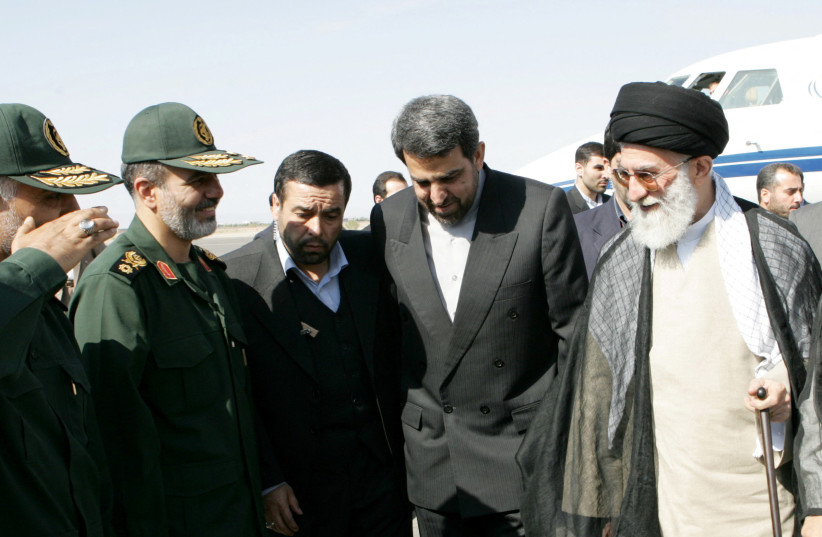by Seth J. Frantzman
The new security chief has a background in the IRGC navy and also in conducting operations near Bandar Abbas.
 |
Iran's new Secretary of the Supreme National Security
Council Ali Akbar Ahmadian is seen next to the late Iranian
Major-General Qasem Soleimani during a meeting in Tehran, Iran, in this
undated picture obtained on May 22, 2023.
(photo credit: Office of the Iranian Supreme Leader/WANA/Handout via Reuters)
|
Iran’s President Ebrahim Raisi appointed Islamic Revolutionary Guards Corps commander Ali Akbar Ahmadian as the country’s Secretary of Iran’s Supreme National Security Council on Monday, causing a major shakeup in the top leadership of Iran.
This is a top security level official and is important for Iran’s internal and regional policies. Ahmadian is replacing Ali Shamkhani. Shamkhani, an admiral in the past, held the post for a decade.
The end of Shamkhani’s long era was predicted by sources overnight Sunday. Iran International noted that “Shamkhani was appointed in his position in 2013. Prior to that, he was defense minister and commander of Iran’s army and IRGC navies. He was a member of the Revolutionary Guard from the early days of the revolution and has been serving as advisor to Supreme Leader Ali Khamenei.”
Shamkhani has been a key figure for many years. The Arab Gulf States Institute in Washington noted in March a controversy regarding his role in Iran-Saudi reconciliation.
“Notably, the recent diplomatic initiative was not led by Iran’s Foreign Ministry. Shamkhani’s leading role in the talks was scrutinized inside and outside Iran, with many interpreting it as a sign of weakness on the part of Iranian Minister of Foreign Affairs Hossein Amir-Abdollahian. The foreign minister responded to such suggestions on Twitter, claiming that Shamkhani was joined by Foreign Ministry officials and that because Iran’s foreign policy is coordinated internally and supervised by the president, Shamkhani’s involvement in the talks should not be seen as evidence of ‘discord’ within the system.”

Shamkhani has been outspoken on the US and Israeli role in the region. In May 2023 he accused the US of being behind Israeli “terrorist attacks” on Iran.
“Jake Sullivan has said that if #Iran tries to produce nukes, the US will recognize Israel's freedom of action to counter. This admission means that the US has been and will be responsible for all terrorist acts of Zionists against Iran's facilities and people, accepting its consequences,” Shamkhani tweeted.
Who is Ahmadian?
Tasnim News, which is considered close to the IRGC reported Ahmadian’s appointment. The report says that Ahmadian “is the head of the Revolutionary Guards Strategic Center and a member of the Expediency Council, and from 1976 to 1979 he was the commander of the Revolutionary Guards Navy and from 1979 to 1986 the head of the Joint Staff of the Revolutionary Guards.”
According to Iran Watch, he was “designated by the UN Security Council on March 24, 2007, pursuant to resolution 1737 (2006), as a person linked to Iran's Islamic Revolutionary Guard Corps; subsequently designated by UN Security Council resolution 2231 (2015); with some exceptions, the designation requires states to freeze assets that are owned or controlled by the person, directly or indirectly, and to ensure that assets are not made available to the person.”
He is considered a terrorist by the US and also has been sanctioned by Japan and Australia, the reports say.
Ahmadian has a background in the IRGC navy and also in conducting operations near Bandar Abbas. He has long experience in these naval operations which likely means he has been involved in operations harassing shipping and targeting US forces at sea in the Gulf.
According to a program at PBS in 2012, Ahmadian has played a key role in developing Iran’s forces.
“While other senior officers such as Soleimani, Vahidi, and Jafari have been the focus of attention in the West, one of Iran's most talented military strategists is the relatively unknown Rear Admiral Ali Akbar Ahmadian. He was born in 1961 in the town of Babak in Kerman province. An outstanding student, he graduated from high school in Kerman and was admitted to the University of Tehran's medical school in 1979. When the Iran-Iraq War broke out the following September, he left the university and joined the Guards and the Basij militia. After his training, he fought at the front in Khuzestan province,” the report said.
It goes on to note that “in July 2000, Ayatollah Ali Khamenei appointed Ahmadian chief of staff of the Guards' forces (a position just below that of the Guards' top commander)…Ahmadian was credited as chief of staff with modernizing the Guards' organization and streamlining its operations. For two years, he was also the commander of Imam Hossein University, a Guard-controlled institution that instills ideological ‘purity’ in the Guards' officer corps. After Jafari was appointed Guard chief in September 2007, Khamenei named Ahmadian to head the Guards' Strategic Center, a post he still holds.”
The report adds that “Ahmadian is credited as one of the very first senior officers to institutionalize the strategy of asymmetric warfare in Iran's military doctrine. It was under his command that the Guards' navy developed its asymmetric warfare strategy to counter the Bahrain-based US Fifth Fleet.”
The appointment of Ahmadian brings another key IRGC military figure to the top ranks of Iran’s leadership. Iran’s leader Raisi has promoted IRGC members throughout. The bureaucracy essentially leads them to take over the state.
Seth J. Frantzman
Source: https://www.jpost.com/breaking-news/article-743813
No comments:
Post a Comment